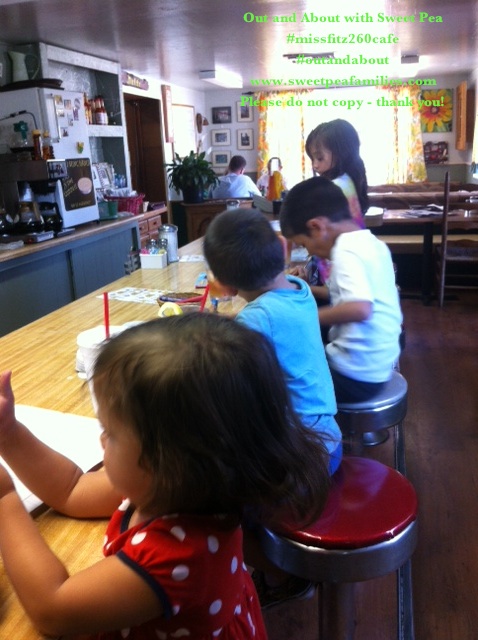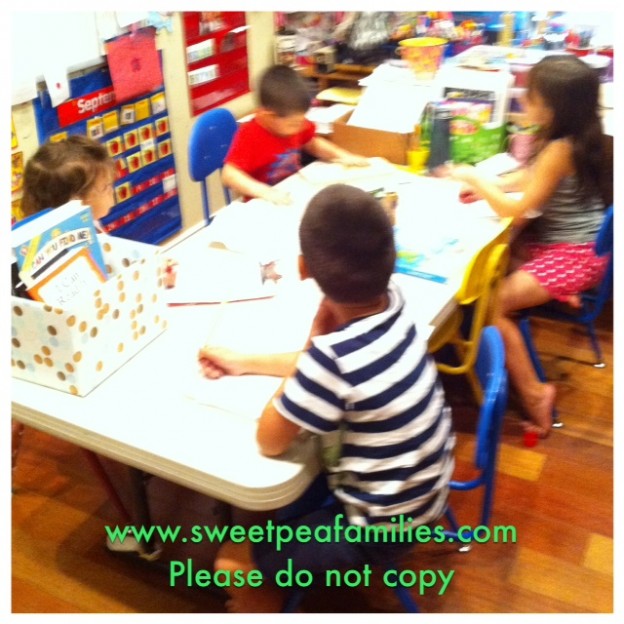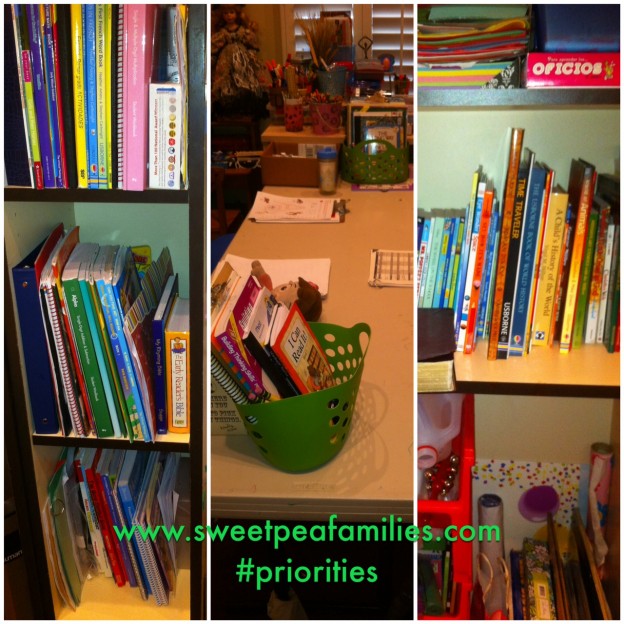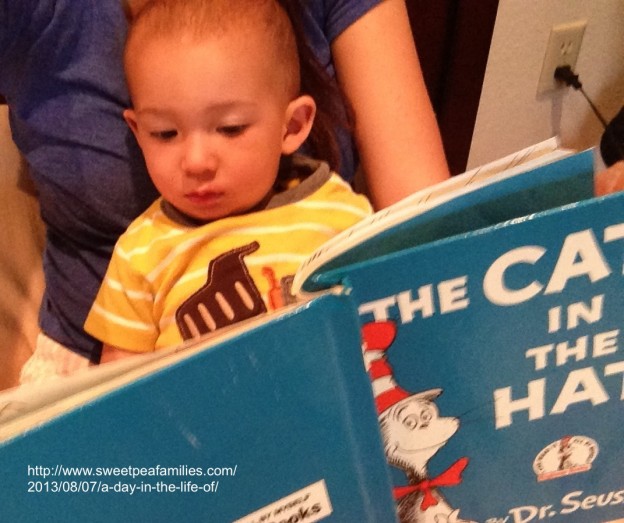One of our student’s sent me the following questions…I sent her the short answer, and thought that a longer answer would make for a great blog post. (and it’s longer! broken up into sections so you can read it in pieces if you want) Thanks, N.M., for tickling my brain!
“Why do you homeschool? How do you feel your kids have benefitted? And how long do you plan to do it? I’m really considering it…but I’m gonna continue to read up on it. I just know when the time comes I will have to convince C.”
Why we homeschool
It started off with a simple desire: I wanted our children to be truly bi-lingual. I wanted them to be able to speak, read and write Spanish. It is my first language, although it is not the one I am the most confident in. I wanted our children to have the advantage of having consistent and deliberate exposure to Spanish as they grew and throughout their school day.
As it turns out, Coach Bruss is of a Libertarian bent and I have evolved to be so, too. We both feel that the public school system is too much about the collective versus individuality. We believe in the sanctity of the individual, and we want our children to grow up being free thinkers and creators, in contrast to the culture of being good at taking tests and standing in lines.
Add in the component of food allergies, and the fact that not all of our children want to sit at a desk to learn, and we are beyond happy with our choice to homeschool. While we have a set curriculum, we are organic in our approach. I learned a long time ago that tears and resistance are a good sign that neither teacher or pupil is ready for the subject matter, and it is best to wait until both arrive at the same place at the same time in regards to reading, writing, and math.
How we feel our children have benefitted
There are so many ways – almost too many to count. Here are some of them in a nutshell:
Puma is able to explore her avocations – she loves horses and dance. We read books about horses, and periodically throughout the day, she gets to take dance breaks. She also loves to draw – there is plenty of time for her to do that and she always has access to art supplies.
Night Owl is most definitely our non-traditional learner. He absorbs everything…just not the way you or I might expect. He likes his hands busy and his brain open. He may look like he is playing, then all of a sudden you ask a question and he gives you an answer that includes today’s, yesterday’s and last month’s information synthesized together. He wasn’t interested in reading or writing last year, however, he could build you a structure worthy of a thesis project. This year, he is asking to learn to read. And we are not sounding out words…he is looking at a word, working it out in his head, and he tells me the correct pronunciation. I couldn’t be more proud or flabbergasted at the same time.
Charger is our writer. He loves to put shapes on paper. Recently, he is more into drawing. He figured out how to make the first two letters of his name. Not by repetition – I will write his name for him on top of every worksheet, and he just started copying. One of his favorite phrases is, “I can do it!” Meaning that he doesn’t want me to show him how to do something – he wants to work it out on his own. He has been learning by immersion by sitting in with us for the last couple of years. He knows his shapes, colors, most of his letters, and numbers through 10 without having to be intentionally taught – the information seeped in and now we get to do something with it.
Now it is Otter’s turn to learn by osmosis. She wants to be right in the big fat middle of everything. She wants to be in the schoolroom with us every moment. She likes to use her clipboard and fill up a whole sheet with different strokes and colors. It is a gift to watch her enjoy the time in the schoolroom although at this point she is more of a champion mess-maker than anything else. Even that turns into a lesson as we sort and talk through our clean up.
I love laying out papers, colors, scissors and glue for them to create while I am reading out loud. I like allowing them to bring in some building toys, or do puzzles while I read. I like being able to go outside and do some water play in the middle of the day. Or letting them go into the kitchen to get their own snack, or go to the bathroom when they need to…just allowing their basic needs to be met while we all go on this journey of discovery.
We also have the benefit of flexibility. There are no sick days – if someone is under the weather, they don’t have work to make up – they just devote their energy to recovering and pick up where we left off when they are better. We can take vacations during off-season, and go to the playground, museums, and the zoo with full access to all the fun stuff when most other kiddos are in school. It is such a gift to go and just enjoy these without the weekend crowds! We try to remember to point this out to the kiddos. They sure can tell the difference, and prefer going on “field trips” in the middle of the week.
How long we plan to homeschool
When Coach Bruss and I first talked about homeschooling, we thought we would homeschool through second or third grade. We both agreed that the early years are crucially important to our children’s long-term outcomes:
“The basic facts are compelling. The human brain grows most rapidly during the
prenatal period and the first few years of life, reaching 50 per cent mature weight by
six months and 90 percent by the age of eight. Children’s physical growth is also very
rapid during the early years, but physical maturation is a much more extended process
compared with the changes taking place within the nervous system (Rutter and Rutter,
1993). The earliest months of life are also the period of most rapid synapse formation
– constructing the dense networks of neural connectivity on which cortical activity
depends. Synaptic density increases most between birth and 1 to 2 years of age (when
it is 50% higher than for more mature adults). Densities decline gradually over the
period from 2 to 16 years of age.”
http://unesdoc.unesco.org/images/0014/001474/147499e.pdf
We knew we wanted to be their primary influence during their formative years when they would be learning their core values and the belief systems that they would have to evaluate as adults. Why would we entrust these little treasures of ours to other people? I really believe that we know our children best and we are best suited to be their teachers.
Now Puma is doing her third grade year. At the end of last year, as I saw her enjoying her time with her friends from dance class, I felt a twinge of guilt – maybe I was keeping her from social experiences that she could benefit from. I asked her if she wanted to try public school this year, and she was quick to say, “No!” She likes being together as a family, she likes to be able to ride (horses) and dance and learn and play.
As we see more of what we consider indoctrination finding it’s way into the school system, we are more convinced than ever that we will be homeschooling at least through middle school. We both agree that we do not want to have their first experience with peer pressure and decision making to be in college, so we are racking our brains and trying to figure out how/where/what will have to happen to get them into a high school that is based on the Objectivist philosophy while still honoring the sanctity of our Creator.
Convincing Your Partner in Parenting
Coach Bruss did not know what to think when I told him I wanted a natural birth…and yet we went to Bradley classes together and we learned a lot through that experience. We went to a La Leche League meeting as Bradley students, expecting to see tree-hugging, au natural mamas and ran into a couple of people we knew, and who we would definitely call “normal” – that preconception was changed. And then I bring up that I want to homeschool our daughter….Bruss was containing his eye roll, I know!! However, having been pleasantly surprised with our other choices, he was open to exploring the idea.
So when Puma was about 18 months old, we went to our first homeschool convention. It was an eye-opener for both of us. I thought of homeschooling in the context that I saw my mom teaching my brothers in their bridge year between preschool and kindergarten. I thought we would be doing worksheets and flash cards. Bruss expected tree-hugging, macrame-making mamas with their earth children in tow. What we found was that the homeschool scene of today is huge! There are all kinds of families choosing to homeschool and it blew both of our preconceptions out of the water.
There are choices in curriculum that fit the secular to the spiritual choices. There are options for science and math and creative writing, as well as art, physical education and language studies. The sheer volume of resources that was on the floor at the Phoenix Convention Center pretty much cemented the decision to homeschool. Both of us felt confident that the only thing our children would miss out on would be the negatives of public education.
There is the age-old question: what about socialization? The idea that our children are not going to be able to navigate social situations has always intrigued me. Our children are actually being exposed to a wide strata of instructors and age groups in the activities we do outside the home. They are able to communicate with children their own age, and in addition, they can relate to people who are both older and younger than they are.
One of the benefits of homeschooling is having open lines of communication with your children. You are their teacher, their parent, and their confidante when you intentionally nurture those relationships. There is nothing Puma can’t tell me – she knows I am a safe space for sharing ideas and experiences. There have been instances when the anecdotes she tells me from her dance school makes me raise my eyebrows (internally, of course), and we have the opportunity to talk through those situations and learn from them.
Can this work for our family?
I would encourage any family thinking about homeschooling to think about these questions:
- What is our motivation? What will keep us on this course once we accept the commitment to this path (for now/ for this year)?
- Who will take on the responsibilities of teaching? What will they do to feed their soul so that they can be fully present for the children in a teaching capacity?
- How can we organize our days to honor the commitment to school/unschool?
- When we look down the line – 1 year, 3 years, 5 years down the line, how does this choice fit into the long-term goals we have for our family?
I will start a tab on the blog soon to list homeschooling resources. I spend so much time at the convention looking through resources that I rarely feel the need to research online, however, I know that is not an option for everyone. I know that there are some great pages out there that talk about the hows, whats and whys of this choice in great depth. I will find them and get back to you on those.
Have you ever thought about homeschooling? What crosses your mind when you evaluate that choice? What kinds of resources are you looking for?
Like this:
Like Loading...




